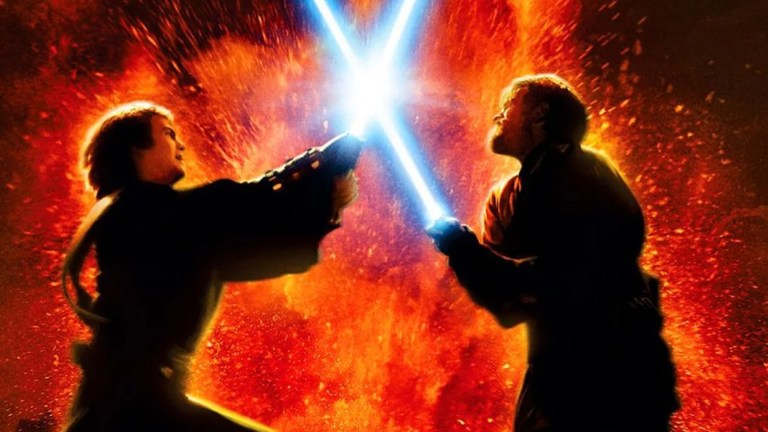Obi-Wan almost didn’t have the high ground at all in an earlier version of Star Wars: Revenge of the Sith’s climactic duel on Mustafar…

Photo: Lucasfilm
One of the most famous scenes in the Star Wars film saga almost didn’t happen at all. Although the movie was always going to end with Anakin Skywalker losing a few limbs, the stunt team behind Prequel Trilogy closer originally choreographed a different climax for Revenge of the Sith‘s final duel between brothers. In fact, an earlier version of the fight on Mustafar didn’t have Obi-Wan getting the high ground on Anakin at all; there was no cocky last leap from young Skywalker to seal his fate.
As Revenge of the Sith stunt coordinator Nick Gillard explained to Empire magazine, “Originally, they both land on the side of the lava flow and immediately start fighting. Anakin disarms Obi and grabs him by the throat. He’s about to chop his head off, but Obi sucks the lightsaber into his hand in a defensive move to try and block it, and in doing so cuts straight through Anakin’s arms and legs.”
So why didn’t it go down that way on screen? According to Gillard, “[George Lucas] wanted something else,” adding that “George is the creator. We would be foolish to second-guess him.” And thus Star Wars history was made. Obi-Wan warned Anakin he had the high ground but the overly confident Sith Lord didn’t listen. Anakin was left to burn on the lava beaches of the volcanic planet, while a heartbroken Obi-Wan walked back to his ship and on his way to exile on Tatooine. It’s only through the intervention of Emperor Palpatine that Anakin survives a final fiery end. The next time we see the charred man that was once a handsome Jedi Knight, it’s in the form of the monstrous Darth Vader.
Elsewhere in the interview, Gillard and Revenge of the Sith producer Rick McCallum also broke down the complex emotions that shaped the Battle of the Heroes, digging into Obi-Wan’s mental state during the duel. In the scene, the Jedi Master has been instructed to kill a man he considers his brother. Obi-Wan is really conflicted during the fight, despite Anakin not only becoming a Sith Lord and betraying the Jedi but also slaughtering children and choking out his pregnant wife on his path to galactic domination.
“While he still has his repertoire of moves that he’s learned from Obi, he’s unpredictable,” Gillard explained of the duels emotional core. “And so even though Yoda has effectively told him to go kill him, I don’t think Obi wants to do that. So Obi has to defend, because he also loves him. He’s just trying to absorb it for as long as he can. And hopefully, Anakin will run out of steam.”
The fight is of course anchored by emotionally-charged performances from Ewan McGregor and Hayden Christensen, putting on a show that rivals the classic Duel of the Fates from The Phantom Menace. Like that battle with Darth Maul, Obi-Wan comes out on top but it’s no victory. Obi-Wan has lost the Jedi Order, the Republic, and his brother in one fell swoop. And yet, while so much of the blame can be placed on Anakin, Obi-Wan still makes the choice not to land a final killing blow, as the newbie Sith Lord lies burning sans most of his limbs.
“He feels he’s done enough damage,” McCallum said of the feelings that final moment between Obi-Wan and Anakin tried to convey. “I also think he doesn’t believe Anakin will recover — he thinks he’s going to die. It’s only because Palpatine comes in and uses everything to save him and create this freak [that he survives]. McCallum adds that Anakin “exploding in fire” in the scene is “un-fucking-believable.”





